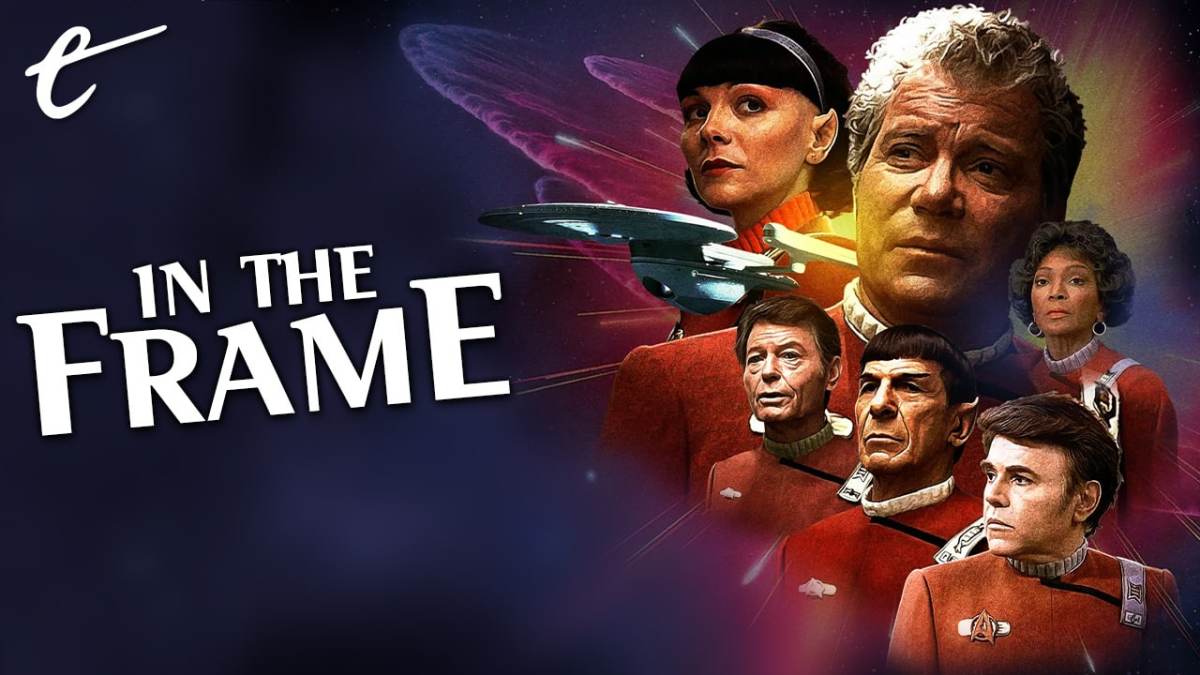Early in Star Trek VI: The Undiscovered Country, James Tiberius Kirk (William Shatner) meditates on a profound question. “How on Earth can history get past people like me?”
It is a bold statement of purpose from the film, which was released as part of the Star Trek franchise’s 25th anniversary celebrations. The Undiscovered Country is the last Star Trek film to feature the entire original cast and is structured as a farewell to these veteran characters. However, what is most striking about The Undiscovered Country, watched three decades removed from its original context, is how comfortable it is in that farewell.
In the grand Star Trek tradition, The Undiscovered Country is a metaphor. Leonard Nimoy pitched director Nicholas Meyer on the story as an allegory for the collapse of the Soviet Union, with the Klingon Empire suing for peace after the destruction of the moon Praxis. This natural disaster stood in for the role that Chernobyl played in the dissolution of the U.S.S.R. Kirk even explicitly alludes to Francis Fukuyama’s theory of “the end of history” that would follow the end of the Cold War.
However, The Undiscovered Country is not just a celebratory farewell. It is a reckoning. Star Trek was a product of the Cold War, and the Klingons had long been stand-ins for a racialized enemy other. They were frequently played by white actors in brownface with Fu Manchu goatees to make them look (to quote the teleplay for their first appearance) “Oriental, hard-faced.” Over the years, the portrayal of the Klingons would grow more nuanced, but those early portrayals are unsettling.
The end of the Cold War forces the characters to grapple with the legacy of that portrayal. Kirk is horrified that Spock (Nimoy) volunteered the Enterprise to escort the Klingon Chancellor to Earth. “Don’t believe them!” Kirk protests. “Don’t trust them!” Spock responds, “They are dying.” Kirk retorts, “Let them die!” Later, in a personal log entry, Kirk concedes, “I’ve never trusted Klingons, and I never will.” The film makes it clear that Kirk’s opinions about Klingons are not an outlier.

The Undiscovered Country is in many ways about grappling with the boundaries of the utopianism of the original Star Trek. One key (and influential) sequence finds Kirk literally placed on trial. The original Star Trek was reasonably progressive for its time, with characters like Uhura (Nichelle Nichols) inspiring women like Whoopi Goldberg or Mae Jemison. However, there were clear limits to that idealism baked into the premise — many of them baked in by series creator Gene Roddenberry.
To pick an illustrative example, it’s notable that Roddenberry’s script for the final episode of the original run of Star Trek was essentially an extended treatise on how women were unfit for command. Even Leonard Nimoy called out the script’s staggeringly sexist argument “that women, although they claim equality, cannot really do things as well as, under certain circumstances, as a man” in an interview conducted for William Shatner’s memoir, Where No Man…
The Undiscovered Country arrived at the start of the 1990s, as American pop culture grappled with the legacy of the 1960s. A large part of the decade’s culture war concerned the argument that ‘60s liberalism had gone too far. This is most obvious looking at films like Forrest Gump, which plays as a nostalgic critique of the era’s counterculture. It’s also obvious looking at coverage of the Clinton Impeachment, which portrayed Clinton’s sexual indiscretions as a consequence of 1960s liberalism.
In contrast, The Undiscovered Country critiques the limits of 1960s liberalism. Early on, the film places a racist tirade in the mouth of Admiral Cartwright, played by Brock Peters. Peters is still probably best known for playing Tom Robinson in the 1962 adaptation of To Kill a Mockingbird. When Kirk arranges a diplomatic meal, Chekov (Walter Koenig) quips “guess who’s coming to dinner,” evoking the classic 1967 racial drama. Even the climax evokes the Kennedy assassination.

At its core, The Undiscovered Country is a film about how eventually history catches up to yesterday’s progressive heroes and that those heroes need to step aside and let a younger generation take charge — perhaps even the next generation. After Chancellor Gorkon (David Warner) is assassinated, his daughter Azetbur (Rosanna DeSoto) continues his dream. “You’ve restored my father’s faith,” she tells Kirk at the climax. Kirk responds, “And you’ve restored my son’s.”
It’s impossible to imagine a modern franchise making so bold a statement, allowing its aging heroes one more turn in the spotlight while also explaining why the franchise needs to move on. Indeed, The Undiscovered Country was controversial at the time. Gene Roddenberry objected to the movie’s plot, just as he had objected to now-beloved Star Trek: The Next Generation episodes like “The Measure of a Man” or “Family.” Maybe Kirk wasn’t the only person history needed to get past.
Fandom reaction to The Undiscovered Country was quite polarized. J.M. Dillard’s novelization was occasionally even passive-aggressive toward it, at points appearing to “critique the movie it’s about.” Some of these scars linger; writer Keith R.A. DeCandido recently complained that The Undiscovered Country made Kirk look like “a racist shithead.” However, in spite of this, The Undiscovered Country never generated as vocal or consistent a backlash as the recent Star Trek shows or Star Wars movies.
There’s something endearing and enduring in the way that The Undiscovered Country rejects comfortable nostalgia. At one point, the villainous Chang (Christopher Plummer) appears to entice Kirk with the promise that Kirk doesn’t need to change. “Oh now, be honest, Captain,” Chang chides. “Warrior to warrior: you do prefer it this way, don’t you? As it was meant to be.” Chang offers to reset the status quo, to let Kirk continue fighting Klingons forever and ever.

The Undiscovered Country understands that the future is a threatening prospect, especially for a generation that has grown up with a particular idea of what the world looks like. “Your father called the future ‘the undiscovered country,’” Kirk tells Azetbur. “People can be very frightened of change.” Gorkon likens the future to “the undiscovered country” from Shakespeare’s Hamlet, a metaphor for death. However, The Undiscovered Country suggests that it might just be the unknown.
Three decades later, it’s impossible to imagine a major franchise demonstrating this level of introspection without provoking a fandom civil war. The Undiscovered Country provides a contrast with films like The Rise of Skywalker, in that The Undiscovered Country is about an older generation learning that they need to step aside and make room for those that will follow, while The Rise of Skywalker is about how the older generation is never too old for a joyride in the Millennium Falcon.
It is instructive to compare The Undiscovered Country to the attempts to bid farewell to The Next Generation in the decades that followed. Star Trek: Nemesis sold itself as “a generation’s final journey,” mirroring the plot of peace with the Klingons with a plot about peace with the Romulans. However, Nemesis failed to meaningfully grapple with the idea of the crew’s maturity, beyond opening with the wedding of Deanna Troi (Marina Sirtis) and William Riker (Jonathan Frakes).
If anything, Jean-Luc Picard (Patrick Stewart) was less mature than he had been on the show, given his newfound (actor-dictated) enthusiasm for dune buggies. The film hinges on Picard defeating his younger self, a Romulan clone named Shinzon (Tom Hardy). While Nemesis does kill off the fan favorite character of Data (Brent Spiner), it also replaces Data with an identical copy called B4 (also Spiner). As such, there is no sense of farewell or finality, no sense that it is time to move on.

This continues into the recent spin-off Star Trek: Picard. The show begins as a story of generational failure even more severe than that in The Undiscovered Country, acknowledging Picard’s failures to the younger generation that followed him, confronting him with the traumas inflicted on his surrogate son Elnor (Evan Evagora), his mentee Rafaella “Raffi” Musiker (Michelle Hurd), and even Seven of Nine (Jeri Ryan).
Picard finds the title character tasked with protecting Data’s twin daughters, Dahj and Soji (Isa Briones), as a way of atoning for his failures. There are a lot of dead children in Picard, from Seven’s surrogate son Icheb to Troi and Riker’s son Thaddeus. However, Picard is never about the title character learning that he needs to step aside and let these children decide for themselves. Instead, Picard ends with the character lecturing a planet full of young androids about how he knows best.
Throughout Picard, the character grapples with a terminal illness. In the season finale, it seems like he might die, perhaps the most literal acknowledgement that time waits for no person. However, the finale is not willing to let the character go; there is a second season to consider, after all. Instead, Picard’s consciousness is uploaded to an android body. Picard is too important to let the Star Trek franchise move beyond him.
In the closing moments of The Undiscovered Country, Kirk delivers his final log entry. When he reaches the final, familiar refrain of “where no man has gone before,” he catches himself. He switches to the non-gendered opening monologue from The Next Generation, “where no one has gone before.” It’s a moment of dignity and consideration. It’s an old man stepping aside gracefully, letting history get past him. It’s a shame that so little of modern pop culture can do the same.





